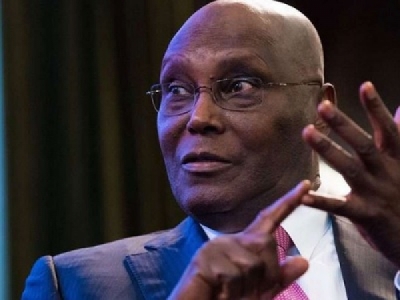
Posted on November 26, 2018
Apparently moved by the plight of commuters, motorists and port users who come to Apapa metropolis on daily basis for business, Atiku Abubakar, the presidential candidate of the People’s Democratic Party (PDP) has assured Nigerians that efforts would be made by his administration to decongest the roads leading to the two major seaports in Lagos – Apapa and Tin-Can Island ports, if voted into power.
This was part of the content of the Atiku’s policy document titled: ‘Get Nigeria Working Again,’ launched on social media platforms on Monday.
Atiku’s plans have become crucial at this time importers and their agents are paying dearly on demurrage to shipping companies and rent to terminal operators for systemic failure, largely caused by dilapidated and congested port access roads as well as over dependent on Lagos ports.
According to the document, Atiku’s administration hopes to improve efficiency in operations in the existing ports and accelerate the development of alternative container ports, especially inland dry ports.
He said his administration would define timelines for completion of concessions granted for inland and dry port development.
If voted into power, his administration will also sort Public Private Partnerships (PPP) and community efforts toward the development of transport infrastructure, he said, saying, “Partner with states and local governments to develop and rehabilitate the connecting road networks.
“We shall target the rehabilitation and development of up to 5,000 kilometres of roads across the nation by 2025. Develop and rehabilitate the connecting road networks across the geo-political zones.
“Bulk of the transport activity is along three corridors, and traffic volumes are expected to double within the next 20 years: Lagos to Kano (Western corridor); Port Harcourt to Kaduna (Eastern corridor) and Lagos to Cross River (West – East corridor).”
He pledged to use alternative means of transportation by developing a new National Transport Policy that would address issues relevant to promoting inter-modalism, including institutional fragmentation, intermodal regulation, intermodal connectors and measuring transport system performance.
“We will encourage transportation development around the nation’s agricultural and industrial clusters. Enhance linkages to agricultural zones and develop agricultural collection and distribution hubs in Jebba, Lafia, Makurdi, Lokoja, Pategi/Baro, Shendam and Jalingo,” he assured.
He said he would develop the Lagos – Abuja rail network on the standard gauge system to revive Nigeria’s rail system.
Commenting on this, Emma Nwabunwanne, a Lagos-based importer, who commended the plans to decongest Lagos Port, said port users would be relieved if Atiku’s administration would deliver on the promise.
Apart from developing inland ports, Nwabunwanne urged Atiku to ensure that other seaports in the Eastern part of the country become fully utilised. He however noted that there was need to effectively revive the rail lines by concessioning the rail system for effective use.
“The environment around Apapa port city is no longer conducive for seamless port operation. The man-hour lost on the roads leading to Lagos ports by port users, container carrying trucks and operators, have been quiet disheartening,” Jonathan Nicole, president, Shippers Association of Lagos State, said.
Listing the operational challenges facing Eastern ports, Nicole urged Atiku to deal with issues around insecurity on the water channels, widening infrastructural gap and the shallow draught of the water channels leading to some of the ports in the East, which limits bigger vessels with higher capacity from berthing in those ports.
Statistics show that despite the nearness of Eastern ports to markets in the North and the East, importers in these locations have continued to make ports in Lagos their preferred destination for taking delivery of their consignments.
Source: Business Day





